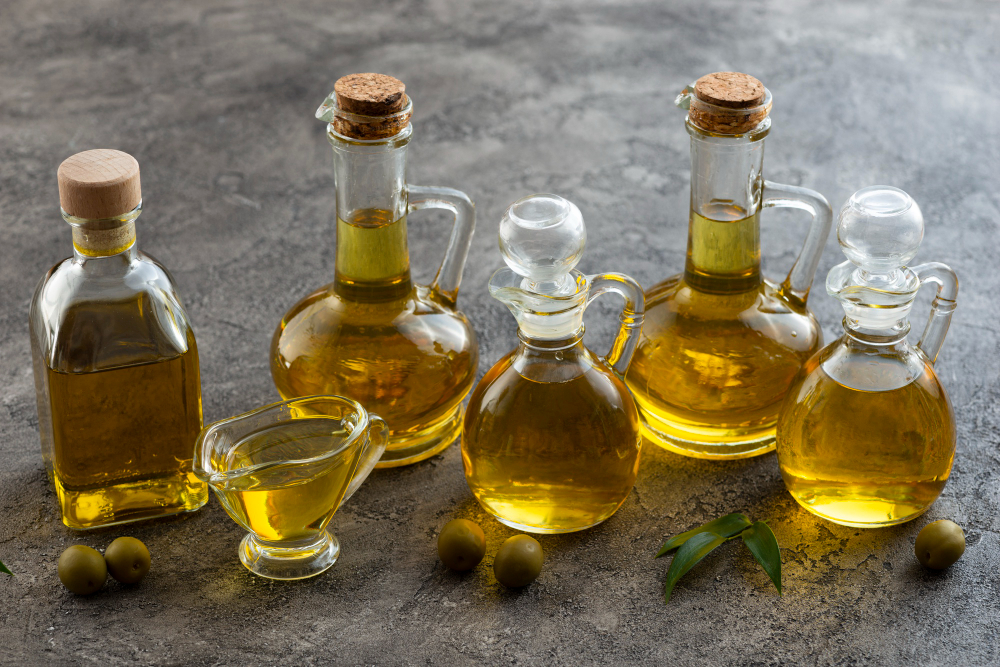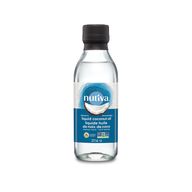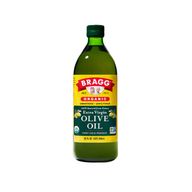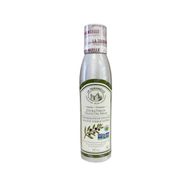Healthy Cooking Oils: 5 Perfect Substitutes for Canola Oil
As a nutritionist, I often get asked about healthy cooking oils. One oil that has gained popularity in recent years is canola oil. While it's true that canola oil has some health benefits, such as being low in saturated fats and high in monounsaturated fats, some people prefer to avoid it for various reasons. Maybe you're allergic to it, or you don't like the taste. Whatever the reason, don't worry, there are plenty of substitutes for canola oil that are just as healthy, if not more so. In this article, I'll share five substitutes for canola oil that you can use in your cooking.
Coconut oil
Coconut oil is a popular choice among health enthusiasts, and for good reason. It's rich in medium-chain triglycerides (MCTs), which are easily metabolized by the body and can provide an energy boost.
Coconut oil is also high in lauric acid, a type of saturated fat that has been shown to raise HDL (good) cholesterol levels and may help protect against heart disease. A systematic review published on Nutrition Reviews in 2020 summarized 12 studies that prove coconut oil significantly raised HDL cholesterol when compared with other plant oils and animal oils.
One thing to keep in mind when using coconut oil is that it has a low smoke point, which means it's not ideal for high-heat cooking methods like frying. However, it's great for baking, sautéing, and stir-frying at moderate temperatures. You can also use it as a spread or in dressings and dips.
Avocado oil
Another healthy oil that can replace canola oil is avocado oil. It's high in monounsaturated fats, which have been shown to help lower LDL (bad) cholesterol levels and reduce inflammation in the body. Avocado oil is also rich in antioxidants, which can help protect against cellular damage.
On top of cardiovascular support, according to an animal study published in Frontiers in Pharmacology, avocado oil alleviated non-alcoholic fatty liver disease by decreasing oxidative stress and inflammation in the experimental subjects taking high-fat, high-sugar diets.
Avocado oil has a high smoke point, making it suitable for all types of cooking, including frying and grilling. It has a mild, buttery flavor that won't overpower your dishes, making it a versatile ingredient in your kitchen.
Olive oil
Olive oil is a staple in Mediterranean cuisine and has been used for centuries for its health benefits. It is high in monounsaturated fats, which can help reduce the risk of heart disease and stroke. Olive oil is also rich in polyphenols, which have been shown to have anti-inflammatory and antioxidant properties.
A famous study on olive oil is the Prevención con Dieta Mediterránea (PREDIMED) trial. This large randomized trial involved 7,447 participants at high cardiovascular risk. The trial showed that participants who consumed a Mediterranean diet supplemented with extra-virgin olive oil had a 30% lower risk of developing major cardiovascular events, including myocardial infarction, stroke, or death from cardiovascular causes, compared to a group that followed a low-fat diet with professional dietary advice to reduce dietary fat. These results were observed after a median follow-up of 4.8 years.
When buying olive oil, look for extra-virgin or virgin olive oil, as these are the least processed and contain the highest amount of nutrients. Use olive oil in dressings, dips, and marinades, or drizzle it over roasted vegetables or pasta dishes. It's also great for sautéing and stir-frying at moderate temperatures.
Grapeseed oil
Grapeseed oil is a lesser-known oil that's worth considering as a substitute for canola oil. It's high in polyunsaturated fats, which have been shown to help lower LDL (bad) cholesterol levels and reduce the risk of heart disease. Grapeseed oil is also rich in vitamin E, a powerful antioxidant that can help protect against cellular damage. One tablespoon of grapeseed oil supplies 3.9 mg of vitamin E, which is a quarter of your daily vitamin E needs.
In a study published on International Journal of Food Science and Nutrition, 44 overweight or obese females were compared for the health effects of daily consumption of either grapeseed oil or sunflower oil. The study showed that compared to those taking sunflower oil, participants who consumed grapeseed oil experienced improved insulin resistance and a reduction in the levels of C-reactive protein (CRP), a common inflammatory marker.
Grapeseed oil has a high smoke point, making it ideal for high-heat cooking methods like frying and grilling. It has a neutral flavor that won't affect the taste of your dishes, making it a great all-purpose oil in your kitchen.
Walnut oil
Finally, if you're looking for an oil that's high in omega-3 fatty acids, look no further than walnut oil. Omega-3s are essential fatty acids that our bodies need but can't produce on their own, so we must get them from our diets. In addition to its primary ingredient, fatty acids, walnut oil contains a range of other beneficial compounds such as phenols, sterols, squalene, melatonin, vitamins, and minerals. These bioactive compounds offer significant health benefits such as antioxidant, antitumor, and cholesterol-lowering effects, making them a valuable addition to one's diet.
A randomized controlled clinical trial conducted on type two diabetic patients reviewed that daily consumption of 15 g of walnut oil for 3 months resulted in improved glood glucose level.
Walnut oil has a low smoke point, so it's not suitable for high-heat cooking methods, but it's great for dressings, dips, marinades, and drizzling over cooked dishes like roasted vegetables or fish.
In conclusion, while canola oil may have its benefits, it's not the only healthy oil out there. Coconut oil, avocado oil, olive oil, grapeseed oil, and walnut oil are all great substitutes that offer their unique health benefits and flavor profiles. When choosing an oil, look for unrefined or minimally processed oils, as they retain more of their nutrients. Also, consider the smoke point of the oil and the cooking method you'll be using it for. With these tips in mind, you can confidently experiment with different oils and find the ones that work best for you and your health goals.
References
Teng, M., Zhao, Y. J., Khoo, A. L., Yeo, T. C., Yong, Q. W., & Lim, B. P. (2020). Impact of coconut oil consumption on cardiovascular health: a systematic review and meta-analysis. Nutrition reviews, 78(3), 249–259. https://doi.org/10.1093/nutrit/nuz074
García-Berumen, C. I., Vargas-Vargas, M. A., Ortiz-Avila, O., Piña-Zentella, R. M., Ramos-Gómez, M., Figueroa-García, M. D. C., Mejía-Zepeda, R., Rodríguez-Orozco, A. R., Saavedra-Molina, A., & Cortés-Rojo, C. (2022). Avocado oil alleviates non-alcoholic fatty liver disease by improving mitochondrial function, oxidative stress and inflammation in rats fed a high fat-High fructose diet. Frontiers in pharmacology, 13, 1089130. https://doi.org/10.3389/fphar.2022.1089130
Millman, J. F., Okamoto, S., Teruya, T., Uema, T., Ikematsu, S., Shimabukuro, M., & Masuzaki, H. (2021). Extra-virgin olive oil and the gut-brain axis: influence on gut microbiota, mucosal immunity, and cardiometabolic and cognitive health. Nutrition reviews, 79(12), 1362–1374. https://doi.org/10.1093/nutrit/nuaa148
Irandoost, P., Ebrahimi-Mameghani, M., & Pirouzpanah, S. (2013). Does grape seed oil improve inflammation and insulin resistance in overweight or obese women?. International journal of food sciences and nutrition, 64(6), 706–710. https://doi.org/10.3109/09637486.2013.775228
Zibaeenezhad, M., Aghasadeghi, K., Hakimi, H., Yarmohammadi, H., & Nikaein, F. (2016). The Effect of Walnut Oil Consumption on Blood Sugar in Patients With Diabetes Mellitus Type 2. International journal of endocrinology and metabolism, 14(3), e34889. https://doi.org/10.5812/ijem.34889


![[Clearance] La Tourangelle, Avocado Oil, 500 ml](https://d2enfqsrk2l68j.cloudfront.net/eyJidWNrZXQiOiJsaWZlcGx1cy1oZWFsdGgiLCJrZXkiOiJzdG9yZVwvaXRlbVwvMjQ4XC9pbWFnZVwvYWFkYTVjOTc4MWZiMzk0NjU3MTI2MWM3YjMyNDAyYTEiLCJlZGl0cyI6eyJyZXNpemUiOnsid2lkdGgiOjE5MiwiaGVpZ2h0IjoxOTIsImZpdCI6Imluc2lkZSIsImJhY2tncm91bmQiOnsiciI6MjU1LCJnIjoyNTUsImIiOjI1NSwiYWxwaGEiOjF9LCJ3aXRob3V0RW5sYXJnZW1lbnQiOnRydWV9fX0=)
![[Clearance] La Tourangelle, Avocado Spray Oil, 147 ml](https://d2enfqsrk2l68j.cloudfront.net/eyJidWNrZXQiOiJsaWZlcGx1cy1oZWFsdGgiLCJrZXkiOiJzdG9yZVwvaXRlbVwvMzYzNVwvaW1hZ2VcLzczMTY3MzllZjliYTZhNmUyOTBjZWIwNjFkNDc1OGYyLmpwZWciLCJlZGl0cyI6eyJyZXNpemUiOnsid2lkdGgiOjE5MiwiaGVpZ2h0IjoxOTIsImZpdCI6Imluc2lkZSIsImJhY2tncm91bmQiOnsiciI6MjU1LCJnIjoyNTUsImIiOjI1NSwiYWxwaGEiOjF9LCJ3aXRob3V0RW5sYXJnZW1lbnQiOnRydWV9fX0=)


![[Clearance] La Tourangelle, Grapeseed Spray Oil, 500 ml](https://d2enfqsrk2l68j.cloudfront.net/eyJidWNrZXQiOiJsaWZlcGx1cy1oZWFsdGgiLCJrZXkiOiJzdG9yZVwvaXRlbVwvMzYzNlwvaW1hZ2VcL2I5ZDRlNTA0MDhkMjQ1YWMwN2ZiYjZjZTI0ZGQ3OGQ2LmpwZWciLCJlZGl0cyI6eyJyZXNpemUiOnsid2lkdGgiOjE5MiwiaGVpZ2h0IjoxOTIsImZpdCI6Imluc2lkZSIsImJhY2tncm91bmQiOnsiciI6MjU1LCJnIjoyNTUsImIiOjI1NSwiYWxwaGEiOjF9LCJ3aXRob3V0RW5sYXJnZW1lbnQiOnRydWV9fX0=)
